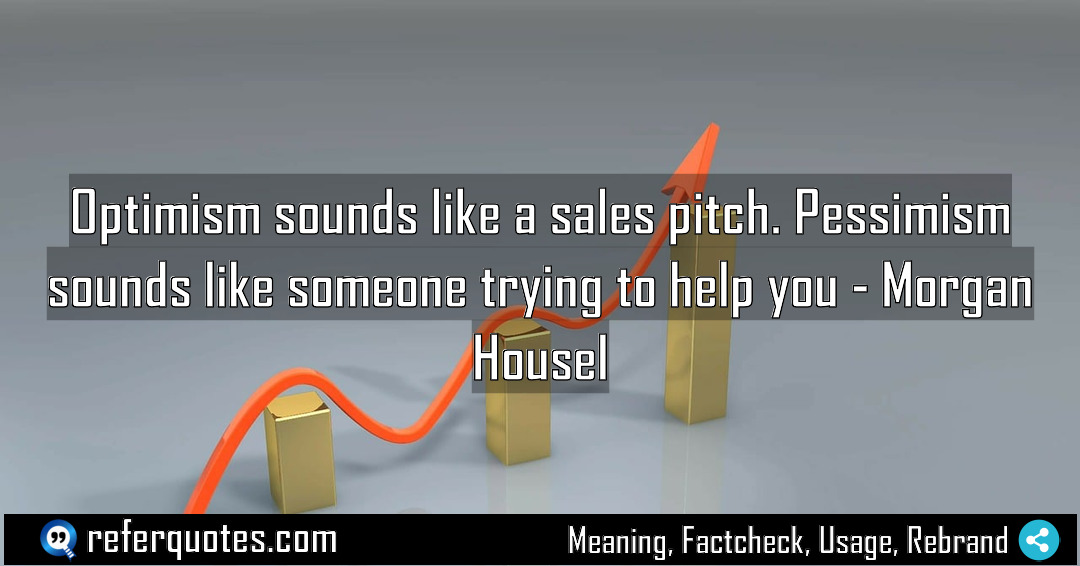
You know, “Optimism sounds like a sales pitch” is one of those lines that just sticks with you. It perfectly captures why we’re instinctively skeptical of cheerleaders and drawn to cautious voices, especially with our money. It’s a psychological trap we all fall into.
Share Image Quote:
Table of Contents
Meaning
At its core, this quote is about the perceived credibility of different tones. It suggests we’re wired to see unbridled optimism as having an ulterior motive, while we interpret pessimism as a form of protective, disinterested advice.
Explanation
Let’s break this down. Think about the last time someone was overwhelmingly positive about an investment or a business idea. Feels a bit like they’re trying to sell you something, right? That’s because optimism often comes with an agenda—a need for you to buy in. It’s forward-looking and promises a better future, which is the essence of a pitch.
Pessimism, on the other hand, feels different. It feels like someone is pointing out the potholes in the road you’re about to drive down. There’s no apparent reward for them. It feels like they’re trying to save you from pain. It feels like help. And that’s the dangerous, beautiful part of it. The most valuable financial lesson I’ve learned is to be wary of both extremes. The optimist might cost you opportunity, but the pessimist can cost you your capital if you let their “help” paralyze you.
Quote Summary
Reading Level60
Aesthetic Score70
Origin & Factcheck
This is a direct quote from Morgan Housel’s fantastic book, The Psychology of Money, which was published in 2020. You might see similar sentiments floating around, but this specific, crisp phrasing is all Housel. It’s a modern classic for a reason.
Attribution Summary
Where is this quotation located?
| Quotation | Optimism sounds like a sales pitch. Pessimism sounds like someone trying to help you |
| Book Details | Publication Year: 2020; ISBN-10: 0857197681; ISBN-13: 978-0857197689; Pages: 256 (approx.) |
| Where is it? | Approximate chapter: Pessimism vs Optimism |
Context
In the book, Housel uses this idea to explain why it’s so hard to make good financial decisions. We’re bombarded with optimistic pitches from the media and financial industry, while the most prudent, long-term advice—which involves acknowledging risk and the potential for loss—often sounds boring, cautious, and, well, pessimistic. It’s a battle between what feels good and what is good.
Usage Examples
I use this mental model all the time. Here’s how:
- In Team Meetings: When someone presents a wildly optimistic forecast, I’ll gently remind the group, “Remember, optimism can sound like a sales pitch. Let’s pressure-test this with some ‘what-if’ scenarios.” It shifts the conversation to risk management.
- For Personal Finance: When a friend tells me about a “can’t-miss” crypto or stock tip, I hear the sales pitch. This quote helps me step back and ask, “What’s the downside?” It’s my shield against FOMO.
- Audience for this Quote: It’s perfect for entrepreneurs evaluating new ventures, investors assessing opportunities, and really anyone trying to make a big life decision surrounded by noisy, conflicting advice.
To whom it appeals?
Share This Quote Image & Motivate
Motivation Score55
Popularity Score70
Shareability Score70
FAQ
Question: So, is pessimism always better than optimism?
Answer: Absolutely not. That’s the real trap. The goal isn’t to be a pessimist; it’s to recognize your own bias toward hearing “help” in a negative voice. The wisest stance is a realistic one that weighs both potential and risk.
Question: How can I avoid falling for this bias?
Answer: It’s all about questioning the messenger’s incentives. Ask yourself: Is this person trying to sell me something, or do they have nothing to gain from my decision? And crucially, apply the same skepticism to the pessimist. What do they gain by being negative? Sometimes it’s just to feel smart.
Question: Can you give an example from history?
Answer: Think about the dot-com bubble. The optimists were on TV every day with a new sales pitch for pets.com. The pessimists were the ones saying, “Hey, these companies have no profits.” They sounded like they were trying to help people avoid a crash. And they were, but listening to them also meant missing out on the early, legitimate growth. It’s never black and white.
Similar Quotes
You know, I’ve seen this play out so many times. Optimism is the one quality more associated with success… it’s not just a fluffy idea. It’s the engine. The real…
Prospecting is the lifeblood of sales success… it’s a line you hear a lot, but most people don’t really feel it in their bones. They treat prospecting like a chore,…
You know, “The intelligent investor buys from pessimists” isn’t just a line—it’s a battle-tested strategy. It’s all about finding value where others see only fear and capitalizing on the euphoria…
You know, the whole “a disciplined investor neither gets overly optimistic” idea from Graham is basically the investor’s mantra for keeping your head when everyone else is losing theirs. It’s…
Optimists are usually resilient and may recover from setbacks faster… It’s not just feel-good fluff. It’s a hard-wired cognitive advantage that changes how you process failure. Table of Contents Meaning…
